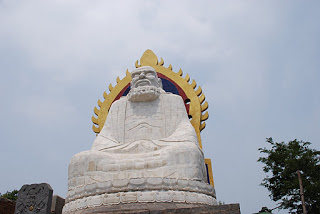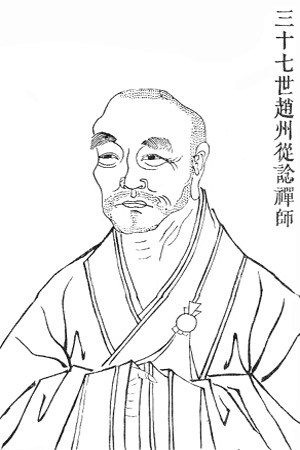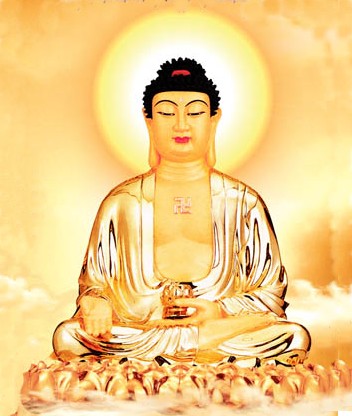IS ENLIGHTENMENT SUDDEN OR GRADUAL?

Bodhidharma, picture taken from http://vitiosusblog.blogspot.com/2011/11/bodhi-dharmas-cave.html
Question
Historically, is the sudden Enlightenment of the Art of Zen only possible due to prior gradual progression in Zen fundamentals, as in a time toiling hard working millionaire?
Or did sudden Enlightenment without gradual preparation also happen due to a Buddha's grace, as in someone who instantly inherited a million from a gracious benefactor without having to do any work?
Or somewhere in between, as in a sincere student's one step of devotional effort being reciprocated by 10 steps of Grace from the Master?
Prefaced to the above questions is the seemingly impossibility of completely cleansing, without a speck of dirt, all accumulated karma from countless lifetimes in the here and now without factoring in the Grace of Buddha which makes anything possible.
Dr Damian Kissey
Answer
In the past as well as at present, whether Enlightenment happens instantly or gradually in Zen is a matter of perception. Viewing it from the present perspective, i.e. in the present life, Enlightenment in Zen is instantaneous. This, in fact, is the hallmark of Zen.
In other words, when conditions are ideal, when a cultivator has cleared his mind of all thoughts, like being shocked by a "gongan", or seemingly illogical questioning and answering, or merging his mind into the Cosmos without any thought, he attains Enlightenment instantly. In advanced courses in our school, like Cosmic Breathing, Merging with the Cosmos, and Big Universe, the experience is a spiritual awakening as we return to our phenomenal world.
However, viewing it from a cosmic dimension, i.e. over countless lifetimes, Enlightenment even in Zen is a gradual process. After spiritual development over many lifetimes, as a result of his good karma, a cultivator eventually comes into an ideal situation when he can attain a spiritual awakening or Enlightenment instantly. If he is not ready, prepared by a gradual progress of spiritual attainment, even when a Zen master provides him a "gongan", or we offer him those advanced courses, he would still miss the opportunity.
In history, Liang Wu Di, the emperor who had an audience with Bodhidharma, missed the golden opportunity twice. When the emperor, having related his many good deeds like building temples and translating sutras, asked Bodhidharma whether he had any merits, the great Zen monk answered "No".
This was a "gongan" to shock the emperor into having no thoughts, whereby he could attain Enlightenment or at least a spiritual awakening. Seeing the emperor missed the opportunity, the great Zen master explained to him intellectually. Bodhidharma explained that what the emperor had done was cultivation of blessings, not merits. Cultivating blessings brought good karma. In fact, Liang Wu Di had very good karma, cummulating in his becoming an emperor of a prosperous empire.
Cultivating merits trained the mind, or spirit, so that the personal mind would merge into the Universal Mind. The aim is to transcend karma. In classical Chinese terms, it is jumping beyond the three realms. The three realms are the realm of desire, the realm of form, and the realm of non-form. The three realms constitute the phenomenal world, which includes not only our puny world but also heavens and hells.
Humans, all the creatures we see in our world, as well as gods and ghosts exist in the realm of desire. Brahma-gods exist in the realm of form. Bodhidattvas and arahans exist in the realm of non-form. When a cultivator jumps beyond the three realms, he attains Buddhahood, or in Western terms returning to God the Holly Spirit.
Cultivating blessings is different from cultivating merits. Cultivating blessings is to avoid evil and do good, which will result in good karma, abiding the cultivator in the phenomenal realms. Cultivating merits is cultivating the mind, which eventually liberates him from the phenomenal realms, and the cultivator merges into Cosmic Reality where there is no differentiation between the knower and the known.
After explaining the difference between cultivating blessings and cultivating merits to the emperor, though not as explicitly as I have done here, the great Bodhidharma gave the empeor another chance when the emperor asked, “Who is this person before me?”, to which Bodhidharma answered, "I don't know".
It was a "gongan" to shock the emperor into non-thought so that he might attain a spiritual awakening, or even Enlightenment. In transcendental Cosmic Reality, there are no differentiated entities. It is just one continuous spread of consciousness. When there was a difference between Bodhidharma and the emperor, they experienced the phenomenal world.
It is incredible that many of our students experienced this transcendental reality. In the Small and Big Universe Course in Toronto on 27th April 2014, for example, about 75% of the more than 50 course participants expanded their spirit beyond their physical body and experienced that they were everywhere and nowhere.

The great Zen master, Zhao Zhou, picture taken from http://terebess.hu/zen/zhaozhou.html
There was a similar "gongan", which literally means a public record of actual Zen experiences especially concerning attaining spiritual awakenings or Enlightenment, when a monk asked the famous Zen master, Zhao Zhou.
"Master, does a dog have Buddha nature?"
Every monk, in fact every person who had some basic knowledge of spiritual cultivation, knew the answer. All beings, including dogs, have Buddha nature. In Western terms, all beings have the spark of God in them, otherwise God the Holly Spirit would not be everything there is.
But Zhao Zhou answered "No!".
The answer, given at this particular point to this particular monk, shocked him into non-thought, and he attained a spiritual awakening. He postrated and thanked the master.
Viewing from the present perspective, this Zen experience was instantaneous. But viewing from a cosmic perspective, the experience was gradual. The monk had cultivated blessings in his previous lives to be able to become a monk in that particular life to learn form Zhao Zhou.
If other people who lacked the gradual spiritual development of the monk, asked Zhao Zhou the same question and the great master gave the same answer, they would not attain a spiritual awakening. In the same way, if other people who are not our Shaolin Wahnam students, were in my Small Universe Course, they would not attain the Small Universe even though they may learn the right techniques.
Recently someone told me that a kungfu instructor who had been teaching other styles of kungfu for many years, announced in his website that he had a kungfu “enlightenment” after attaining my Intensive Shaolin Kungfu Course. All his other styles of kungfu were raised a few levels due to the “enlightenment”, which was possible after he had trained for many years in the other styles.
Most other chi kung and kungfu students do not have the good karma to learn from us and get the wonderful benefits our Shaolin Wahnam students get even when we are unprecedentedly generous in offering our courses to the public. They cannot even generate a chi flow to have good health, or develop internal force for peak performance.
How do we cultivate blessings to have good karma? An excellent, practical way is to practice the Ten Shaolin Laws, a prerequisite to learn our arts. How do we cultivate merits for spiritual development. An excellent way is to smile from the heart, which will set our spirit free and which we do every time we practice.
Whether Enlightenment, sudden or gradual, is due to a Buddha’s grace is also a matter of perspective. From historical records, the number of Enlightenment through Zen far exceeds that in any other spiritual discipline. Enlightenment through Zen is usually described as sudden. But, as explained above, gradual preparation, often in previous lives, is needed.
The majority of Enlightenment cases were due to the help or grace of a Zen master, whom we may figuratively described as a Buddha. In a minority of cases, some cultivators might attain Enlightenment on their own, like suddenly hearing the sound of a frog jumping into a placid pond. Even in these minority cases, their sudden Enlightenment was due to the teaching of their Zen masters, which eventually could be traced back to the Buddha of our era, Siddhatha Guatama. Siddhartha Guatama attained Enlightenment when he was 29, but due to his great compassion and grace, he continued teaching for another 51 years, not only to humans but also to divine beings.
Sincere cultivators can go to the Western Paradise of Eternal Bliss if they chant Amitabha Buddha’s name with a one-pointed mind. Although going to the Western Paradise, strictly speaking, is not Enlightenment, as the Western Paradise still exists in the phenomenal realm, it may be figuratively described as “enlightenment”. There is no more rebirth into the phenomenal realm in the Western Paradise. The next stage, which is assured by Amitabha Buddha is Enlightenment.
Such "enlightenment" or eventual Enlightenment is usually described as through the grace of Amitabha Buddha. Nevertheless, these cultivators must have accumulated a lot of blessings before they can have this golden opportunity to be reborn in the Western Paradise. Those who do not have sufficient good karma may not believe in or laugh at it when taught the teaching.
Amitabha Buddha states three conditions for those aspiring to the Western Paradise:
- They must believe that the Western Paradise exists.
- They must want to be reborn in the Western Paradise.
- They must cultivate appropriately.
There are a few ways to cultivate to be reborn in the Western Paradise. Probably the simplest is to recite Amitabha Buddha’s name with a one-pointed mind.
Similarly, at a lower level, we have excellent methods and proven records to help patients overcome so-called incurable diseases. But they must satisfy three conditions:
- They must believe that their so-called incurable diseases can be cured.
- They must want to he healthy again.
- They must practice the appropriate methods.
We have much compassion and grace, but if they do not fulfill these three conditions, we do not want to waste our time on them.
As you have rightly mentioned, completely cleansing without a speck of dust here and now all accumulated karma from countless lifetimes is only seemingly impossible, but actually possible, as is evident from historical records, especially in Zen and Pure Land Buddhism.
There are two essentials.
The first essential comprises three conditions:
- The aspirants must believe that it is possible.
- The aspirants must want the possibility.
- The aspirants must practice the appropriate methods.
The second essential, unless the aspirant is already enlightened himself, it is the grace of a Buddha, or an enlightened one.
In all other schools of Buddhism, as well as other spiritual discipline, the attainment of Enlightenment is gradual. But in Zen it is sudden.
Attaining Enlightenment is merging into Cosmic Reality. We are an integral part of Cosmic Reality. At the cosmic level there is factually no separation between ourselves and the snow at the poles, or anything else, like the clothes you are wearing or the computer screen you are looking at.
But due to various conditions, like our senses and collective consciousness, we perceive this continuous, undifferentiated spread of energy as differentiated entities. In Buddhist terms, we see purity though countless layers of dilements accumulated over countless lifetimes.
The orthodox method is to tear off each layer of defilement until purity is reached. This is gradual enlightenment.
The Zen method is to attain non-thought. Since the phenomenal world, figuratively described as defilement, is the result of thoughts, once there is non-thought, the phenomenal world disappears suddenly and purity is reached. This is sudden enlightenment.

Amitabha Buddha, picture reproduced from http://www.dertz.in/wallpapers/download-Golden-Amitabha-Buddha-free-mobile-wallpaper-924.htm
The above is reproduced from the thread Zen Intensive in Hawaii Q&A in the Shaolin Wahnam Discussion Forum
LINKS
